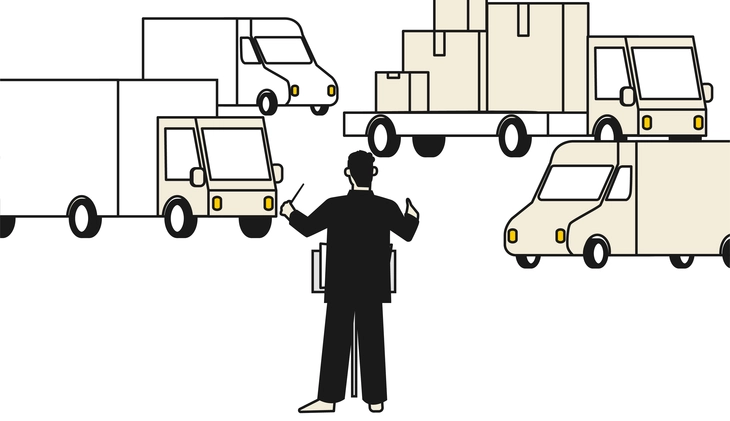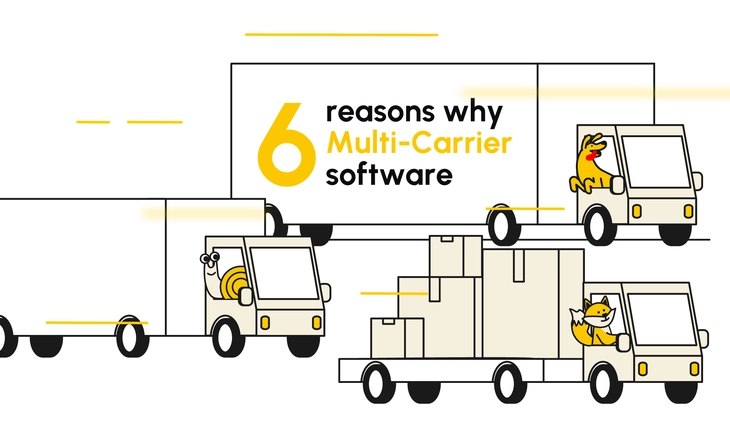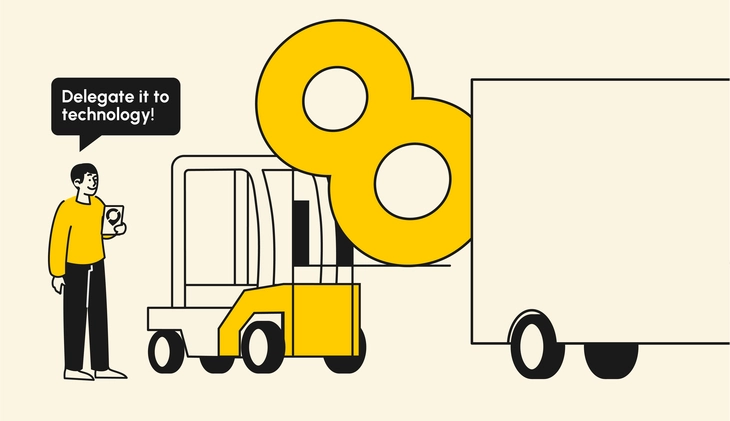Is your business expanding to a new country?
You've got new suppliers and you need to figure out the transport to your factory or warehouse?
Is your goods volume expanding and you're looking to move from spot freight to contract freight?
Are you looking to expand to new freight modes like air, sea or rail?
Or, are you just unsure which logistics partner to choose, or which carriers to even invite to your transport tender?
These are all situations logistics managers and business leaders — like you — have faced.
When it comes to shipping your goods, choosing the right carrier can make a big difference in terms of cost, speed, reliability, and customer satisfaction. However, with so many options available in the market, how do you decide which carrier is the best fit for your needs? In this blog post, we will share 10 tips and factors that you should consider when selecting a carrier for your shipments.
Here are the 10 factors:
1. Coverage (countries, volumes, freight modes)
The first and foremost factor that you should consider is whether the carrier can cover the shipments that you need to move. This depends on the type, size, weight, and volume of your goods, the origin and destination countries, and the mode of transportation that you prefer. Most carriers are strong in some shipping lanes (volumes, modes of transportation) and weak in others. You should look for carriers that have the capacity, network, and expertise to handle your specific shipping requirements.
If you have unique or special needs, such as regional specificity, high value, multimodal, temperature-controlled or hazmat (ADR) shipments, you should prioritize carriers that can accommodate them.
2. Performance (OTIF, reviews)
The second factor that you should consider is how well the carrier performs in terms of delivering your goods on time and in good condition. You should look for carriers that have a proven track record of on-time delivery, high service quality, low damage rates, and high customer satisfaction.
You can measure the carrier’s performance by using objective indicators, such as their on-time delivery percentage, their OTIF (on-time and in-full) score, or their customer reviews. You can also ask for references from other shippers who have used their services and verify their claims.
Tip: Using a transport management software like Cargoson, you can set up a daily report of delayed shipments delivered to your email inbox each morning.
If you'd like neutral, unbiased advice, feel free to contact us at [email protected] - we have worked with hundreds of shippers to set up and optimize their transport management processes and technology.
3. Price (BAF, addons, surcharges)
This probably sounds obvious, but the third factor that you should consider is how much the carrier charges for their services. You should compare the rates offered by different carriers for the same service level and try to get the best value for your money. You should also be aware of the factors that affect the price, such as the mode of transportation, the distance, the weight, the volume, the fuel surcharge, the accessorial fees, and the seasonality. You should also review the terms and conditions of the contract carefully and make sure that there are no hidden or unexpected charges. Many shippers are opting for a transportation management software solution where they can see all their contractual carrier prices, calculated for each shipment, on one dashboard, saving them hours of time each day.
Here are some resources if you'd like to know more about optimizing your freight rate management:
- Watch a 99-second explainer video of the TMS solution
- 5 minute read: Freight Rate Management Software: An Essential Tool for Modern Businesses | Cargoson Blog
- Free consultation
4. Communication
The fourth factor that you should consider is how well the carrier communicates with you and your customers. You should look for carriers that have effective communication tools and systems, such as online tracking, automated notifications, fast responses, and proactive efforts if and when an issue arises. You should also look for carriers that are responsive to your feedback and suggestions and willing to collaborate with you to improve their service.
Modern transportation management software can automate a lot of this for you, so you can be proactive and keep all parties in the loop. For example, two of the most valued features by Cargoson customers are:
1. Automatic shipping notifications to you, your colleagues, customers and partners - booking notifications, ETA updates, truck licence plate updates, documentation updates etc.
2. Daily report of delayed shipments - you receive an email each morning of all the shipments that have not been collected or delivered, but were promised to be by that time.
5. Risk
The fifth factor that you should consider is how much risk the carrier poses to your business and your customers. You should look for carriers that have adequate insurance coverage, high safety standards, good operating status, and clean inspection history. You should also look for carriers that have contingency plans in case of emergencies or disruptions. Is it easy to get a compensation in case something goes wrong? You can ask this information directly from your carriers.
6. Terms
The sixth factor that you should consider is what terms and conditions the carrier offers to you and your customers. You should look for carriers that have flexible and favorable terms that suit your business needs and preferences. This may include payment terms, documentation requirements, cancellation and refund policies, dispute resolution procedures, or other ancillary provisions that may be unique and beneficial to your business.
7. Technology (integrations)
The seventh factor that you should consider is what technology the carrier uses to enhance their service and efficiency. You should look for logistics partners that leverage technology to optimize their operations, such as GPS tracking, electronic logging devices (ELDs), online services etc.
You should also look for carriers that can integrate with your own technology systems, such as your transportation management software (TMS) or your enterprise resource planning (ERP) system.
Additionally, you should look for carriers that can exchange data electronically with you and your customers, such as transport bookings, live tracking information, online documents, and electronic invoices.
However, even if you're working with smaller carriers that do not have all these systems available, a transport management software can help you bring the service level of your smaller carriers up to the standard of larger ones. For example:
- Transport orders can be integrated via email so the order process stays the same for you
- Transport prices can be uploaded and using the TMS's price calculation engine you can still see all the freight prices before and after submitting your booking (more info in this post: Freight Rate Management Software)
- Tracking events can be inputted directly into your TMS by your carriers that do not have automatic shipment tracking systems available
- Documents like PODs, freight invoices etc can be uploaded into your TMS by your carriers manually
- Shipping notifications can still be set up based on different triggers like shipment status updates, ETA updates, vehicle registration plate changes, added documents, tracking events etc.
Even if your smaller carriers do not have all the electronic capabilities of large multinational carriers, you can keep your processes and service levels quite even when using a TMS.
If you need help with integrating your carriers, here are some further resources:
- 9 minute read: Carrier Integration Software: One API, Unlimited Carriers | Cargoson Blog
- Free consultation with our experts - Cargoson specializes in integrating carriers with your software
8. Sustainability (CO2 emission measurement, lowering and compensation)
The eighth factor that you should consider is how environmentally friendly the carrier is. You should look for carriers that adopt green practices to reduce their carbon footprint and minimize their impact on the environment. This may include using fuel-efficient vehicles, reducing emissions, recycling materials, or supporting social causes. Choosing a sustainable carrier can help you improve your corporate social responsibility (CSR) and enhance your brand image. In addition, some customers and suppliers might have policies that prevent them from working with you if the carriers you work with are not up to their environmental standards.
To save you as much time as possible on transport decision-making and reporting based on freight emissions, you might find a lot of value in our greenhouse gas emission calculation software that is integrated it directly into your transportation management dashboard. You can see the CO2-equivalent emissions for all your shipments and for all your carriers before you place a booking, or you can export the values into Excel for reporting.
If you'd like to test it out for free without creating an account, you can check out our free freight emission calculator for all transport modes.
Or, you can request a quick demo to see how it works on your dashboard.
9. Customer Service
The ninth factor that you should consider is how well the carrier treats you and your customers as valued partners. You should look for carriers that provide excellent customer service throughout the shipping process, from booking to delivery. This may include fast, proactive communication, offering personalized solutions, providing timely updates, resolving issues promptly, or exceeding expectations. Choosing a customer-oriented carrier can help you build long-term relationships and increase customer loyalty.
TIP: If your shipment volume is large, you can request a personal account manager from your carriers when conducting a transport tender, and that usually solves most communication problems - even when they are not particularly technologically advanced. Then you can ask them to provide all documentation and information directly through your transportation management system.
10. Reputation
The tenth factor that you should consider is how reputable the carrier is in the industry. You should look for carriers that have a good reputation among their peers, customers, and regulators. This may include having a strong brand name, a positive word-of-mouth, a high market share, or a competitive edge. Choosing a reputable carrier can help you gain trust and credibility in the market and attract more customers.
How does this fit into the freight tendering process?
Carrier selection is a core part of the freight tendering process. Firstly, you need to select the carriers to invite to participate in your tender. Then, you might be involved in some negotiations. And after you've gathered all their proposals, you need to make some decisions: which carriers to work with (fully or just partially), and which ones to leave out.
If you'd like to learn more about how the carrier selection fits into the larger transport tender / freight procurement process, we've put together an article for you: How to Conduct a Simple Transport Tender?
Conclusion
Choosing a carrier is an important decision that can affect your business success. By following these tips and factors that we have shared in this blog post, you can make an informed choice that will meet your shipping needs and expectations. Additionally, we have put together a thorough scorecard that you can download, print out and keep handy whenever you're vetting a new carrier.
If you need more help or guidance in choosing a carrier or managing your shipping process, feel free to contact us at [email protected].
Cargoson is a neutral multi-carrier transportation management software for shippers that can help you simplify your shipping operations without any forwarding or middleman activities. We are just a software tool that can help you save time, money, and hassle in shipping your goods.
Request a 30-minute, no-obligation consultation to discuss whether and how Cargoson can help you select the right carriers and modernize your transport management processes!
![Selecting a Freight Carrier: 10 Tips [+ free scorecard] Selecting a Freight Carrier: 10 Tips [+ free scorecard]](/rails/active_storage/representations/redirect/eyJfcmFpbHMiOnsibWVzc2FnZSI6IkJBaHBBd2o5RVE9PSIsImV4cCI6bnVsbCwicHVyIjoiYmxvYl9pZCJ9fQ==--06447f54e22ae59c29bcf59b8b5f830afd66da06/eyJfcmFpbHMiOnsibWVzc2FnZSI6IkJBaDdDRG9MWm05eWJXRjBPZ2wzWldKd09oSnlaWE5wZW1WZmRHOWZabWwwV3dkcEFwd0VhUUtvQWpvTVkyOXVkbVZ5ZERzRyIsImV4cCI6bnVsbCwicHVyIjoidmFyaWF0aW9uIn19--10281eab5d8180fcaa878b0a83890b25b0279440/selecting-a-freight-carrier-10-tips-plus-free-scoresheet-template-download-cargoson.webp?locale=en)



![How to Select a Multi Carrier Shipping Software: 7 Tips [+ free checklist download] How to Select a Multi Carrier Shipping Software: 7 Tips [+ free checklist download]](https://www.cargoson.com/rails/active_storage/representations/redirect/eyJfcmFpbHMiOnsibWVzc2FnZSI6IkJBaHBBNlcrQ1E9PSIsImV4cCI6bnVsbCwicHVyIjoiYmxvYl9pZCJ9fQ==--17911efdfb74cab1a073d1c9c536393ecfacf242/eyJfcmFpbHMiOnsibWVzc2FnZSI6IkJBaDdDRG9MWm05eWJXRjBPZ2wzWldKd09oSnlaWE5wZW1WZmRHOWZabWwwV3dkcEF0b0NhUUwwQVRvTVkyOXVkbVZ5ZERzRyIsImV4cCI6bnVsbCwicHVyIjoidmFyaWF0aW9uIn19--2c7d6c6b28c4d68db8f7c1f368d1bcdc6ab5275a/CS_newsroom_Logistics%20ABC_How%20to%20Select%20a%20Multi%20Carrier%20Shipping%20Software.png?locale=en)

![How to Conduct a Simple Transport Tender? [+ free template] How to Conduct a Simple Transport Tender? [+ free template]](https://www.cargoson.com/rails/active_storage/representations/redirect/eyJfcmFpbHMiOnsibWVzc2FnZSI6IkJBaHBBeENsREE9PSIsImV4cCI6bnVsbCwicHVyIjoiYmxvYl9pZCJ9fQ==--0770c20699a76b88a052bbfa35e1ab55beb6d4d8/eyJfcmFpbHMiOnsibWVzc2FnZSI6IkJBaDdDRG9MWm05eWJXRjBPZ2wzWldKd09oSnlaWE5wZW1WZmRHOWZabWwwV3dkcEF0b0NhUUwwQVRvTVkyOXVkbVZ5ZERzRyIsImV4cCI6bnVsbCwicHVyIjoidmFyaWF0aW9uIn19--2c7d6c6b28c4d68db8f7c1f368d1bcdc6ab5275a/how-to-conduct-a-simple-transport-tender-freight-procurement-cargoson.jpg?locale=en)